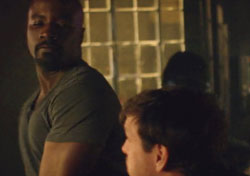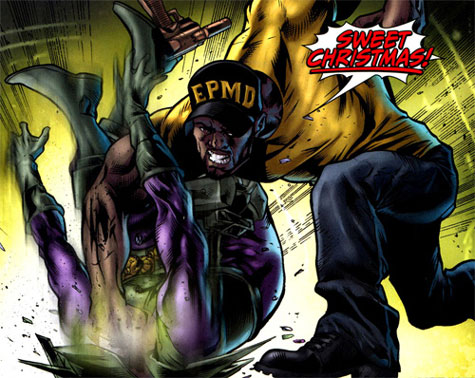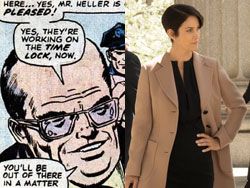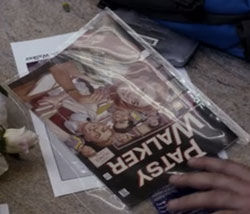
Hello! Welcome to my recaps of Marvel's Jessica Jones. I'm Dave Richards and I'll be your sort of guide as we look at the latest offering from Marvel Studios and Netflix—a series adapted and inspired by Brian Michael Bendis and Michael Gaydos's Marvel Comic series Alias, which ran from 2001-2004 and examined what happens when the world of the hardboiled shamus intersects with the fantastic realm of super powers. That's an especially fascinating combination for me since I love both super heroes and detective stories.
I was originally a fan of the ALIAS comics, and I'm huge fan of the genres it combines, so that love will of course filter into my perspective on Jessica Jones. For this initial recap, I'll be looking at the series’ first four episodes: “AKA Ladies Night,” “AKA Crush Syndrome,” “AKA It's Called Whiskey,” and “AKA 99 Friends.” I'll break down some important plot points and offer insights and observations from my perspective as a lover of both the Private Detective genre and Marvel Comics.
In the initial episode of Jessica Jones, our first glimpse of the title character is a scene lifted straight out of the first pages of Alias #1—she even utters the exact line from the comic. It was a nice homage.
 Krysten Ritter absolutely nails the part of Jessica. She cracks wise, loses her cool, and experiences moments of sheer terror and panic—and it all feels real and believable, down to the specific expressions she conjures up with these emotions. We see the look of horror and panic Ritter portrays when Jess experiences Kilgrave (David Tennant) flashbacks, and the look of loneliness she displays when Jess is watching Luke Cage (Mike Colter).
Krysten Ritter absolutely nails the part of Jessica. She cracks wise, loses her cool, and experiences moments of sheer terror and panic—and it all feels real and believable, down to the specific expressions she conjures up with these emotions. We see the look of horror and panic Ritter portrays when Jess experiences Kilgrave (David Tennant) flashbacks, and the look of loneliness she displays when Jess is watching Luke Cage (Mike Colter).
And let's talk about Luke Cage!
Luke Cage is one of my favorite comic book heroes. He's a super strong ex-con with unbreakable skin that started off as a “Hero for Hire” and has gone through a number of fascinating changes over the years. At one point, he was a member of the Avengers leading several different incarnations of the team.
One of the things I love about Luke is that he's very much an everyman trying to do right by his community and his family. In current comic books, that family includes his daughter, Danielle, and his wife, Jessica Jones — who he became romantically involved with during Alias. That's why Luke is debuting on Jessica Jones first,before getting his own Netflix series next year.
I was very much looking forward to seeing Luke Cage, and these first few episodes didn't disappoint. So far, Mike Colter is the perfect cast for Cage. He's incredibly charismatic, and he definitely displays the everyman and reluctant  hero qualities that Luke has in his early comics. I love the way Colter depicts Cage's abilities and his knowledge of them. During a fight scene in the bar in Episode 2, he's got this wonderful, almost bored look on his face as he deals with the thugs that are attacking him.
hero qualities that Luke has in his early comics. I love the way Colter depicts Cage's abilities and his knowledge of them. During a fight scene in the bar in Episode 2, he's got this wonderful, almost bored look on his face as he deals with the thugs that are attacking him.
Colter isn't just fantastic on his own; he's also great with Ritter. They have fantastic chemistry together, which is evident when they riff off of each other during playful dialogue scenes. One of my favorite parts of the Jessica-Luke relationship so far is during Episode 3 where they reveal their abilities to each other. What resulted was some passionate sex that was fun, funny, and kind of poignant. It was great watching these two people realize that they can be themselves around each other in a way that they can't with others. This even gave Luke Cage a fun way to utter his signature exclamation phrase of “Sweet Christmas!” I clapped and cheered when I heard that.

Of course, as we saw in the flashbacks, there is one huge thing complicating Jessica and Luke's relationship—the fact that Kilgrave used his mind control powers to order Jess to murder Luke's wife, Reva Connors (Parisa Fitz-Henley). Reva is a character from the Luke Cage comics, but there she was an old girlfriend and not connected to Jessica Jones. So, it was an interesting and effective plot development to see Reva used here as a way to tie the two characters together.
Watching her float away from Jessica in the flashbacks was pretty haunting, and those scenes were made even more chilling by the reveal that it was because Jessica had punched her. Luke, of course believes that Reva died in the bus accident that we see after the punch. It will be interesting to see what happens when he finally discovers the truth.
If you think about it, Reva is actually one of the most important characters in this whole story. The flashback in Episode 3 shows that Kilgrave, ordering Jess to kill Reva, loosened his hold on her mind — calling responsibility for Reva’s death into question. It also leads to the bus crash that almost mortally wounded him and allowed Jess to escape. The dramatic thrust of much of the first four episodes of Jessica Jones involves the maneuvers Kilgrave has orchestrated to try and punish her for leaving him to die.
His intricate machinations have been pretty frightening, but what's been especially exciting about Kilgrave is David Tennant's portrayal of the character. The comic inspiration for Kilgrave is actually an old foe of Daredevil, known as the Purple Man because of his lavender skin. His real name is Zebediah Killgrave, and in Alias, Bendis and Gaydos reinvigorated the character by transforming him from a goofy, Cold War-era villain to a vicious Hannibal Lector style manipulator and psychopath.
So it's interesting to see Tennant, who almost played Lector on NBC's Hannibal, bring to life the character of Kilgrave. Who would have thought a guy best known for his heroic and human portrayal of the 10th Doctor on Doctor Who would be so good at playing a monster?
Are you a fan of Hannibal? Check out our coverage here!
And that's what Tennant's Kilgrave is.
What we've seen so far suggests he's a cruel, petty, vindictive man obsessed with his power over people. The way he treated the children in the home he invaded in Episode 2 and the smug and angry way he yelled at Jessica in the flashbacks infuriated me. I seriously hope Jessica really cleans his clock in an upcoming episode.
Taking down Kilgrave won't be an easy task though. As we saw in these first four episodes, his mind control abilities make him a truly daunting foe. He can turn people like Hope Schlottman (Erin Moriarty) into murderous puppets, but he also can use his powers to create an army of loyal followers. There's a great shot at the end of Episode 3 where Jessica discovers all the photos that Kilgrave had of her,which really drives home the feeling of paranoia that comes from such a startling revelation. That feeling is also another great staple of private eye fiction. Detectives are often pitted against foes with the ability, resources, and/or authority to turn almost anyone against them.
Jessica isn't without allies of her own though. Her two, key associates are both established comic characters.
 The first is Jeryn Hogarth, a character who originated in Marvel's Iron Fist series (A television adaptation of Iron Fist is also being developed by Netflix). In the comic, Jeryn and is an older man, while the Jeri featured in Jessica Jones is played by Carrie-Ann Moss. Both characters are highly competent lawyers, but Moss brings a slick, refined, and ultra-professional quality to Hogarth that's fun to watch. I also enjoy the sort of mother/petulant daughter dynamic she has with Jessica. Making her character even more interesting is the fact that Jeri is divorcing her wife (played by the great Robin Weigart) because she's in a relationship with her much younger secretary, Pam (Susie Abromeit).
The first is Jeryn Hogarth, a character who originated in Marvel's Iron Fist series (A television adaptation of Iron Fist is also being developed by Netflix). In the comic, Jeryn and is an older man, while the Jeri featured in Jessica Jones is played by Carrie-Ann Moss. Both characters are highly competent lawyers, but Moss brings a slick, refined, and ultra-professional quality to Hogarth that's fun to watch. I also enjoy the sort of mother/petulant daughter dynamic she has with Jessica. Making her character even more interesting is the fact that Jeri is divorcing her wife (played by the great Robin Weigart) because she's in a relationship with her much younger secretary, Pam (Susie Abromeit).
Jessica's other ally is her best friend Trish Walker (Rachael Taylor). In the Alias comics, Jessica's best friend was Carol Danvers—but Carol is now the titlular character of Marvel Studio's upcoming Captain Marvel feature film. So the creators of the show gave Jessica a new best friend in the form of Trish Walker. In the comics, Trish is best known as Patsy Walker, AKA the superhero Hellcat. When I learned that Trish was going to be a talk radio host on Jessica Jones, it seemed like she was just going to share a surname with her comic counterpart. Fortunately these first four episodes have shown that's not the case.
 Patsy Walker is actually an older Marvel creation that dates back to the '40s where she was the star of an Archie-style, teen romance comic. It was later added to Marvel Comics’ canon that Patsy's mother wrote those comics, and in Jessica Jones,the specter of Trish's mother looms large. She's mentioned as having marketed Patsy dolls based on her daughter. There's also mention of a Patsy television show, and in one scene, Trish is accosted by a fan that drops a Patsy comic!
Patsy Walker is actually an older Marvel creation that dates back to the '40s where she was the star of an Archie-style, teen romance comic. It was later added to Marvel Comics’ canon that Patsy's mother wrote those comics, and in Jessica Jones,the specter of Trish's mother looms large. She's mentioned as having marketed Patsy dolls based on her daughter. There's also mention of a Patsy television show, and in one scene, Trish is accosted by a fan that drops a Patsy comic!
I like how hard Trish tries to be supportive of Jess, but what's most fascinating is that she too is a haunted character. We haven't seen how yet, but it's been subtly hinted that Trish's early stardom lead to her being a victim of some kind of violence. So, she's turned her apartment into a fortress and studies Krav Maga. It should be interesting to see where her obsession with protecting herself and others leads her. Are the writers laying the groundwork for her to become Hellcat?
Jessica’s most useful ally to this point, however, has been her own resourcefulness. In Episode 2, her cunning and detective skills lead her to discover a weakness in Kilgrave's powers—it's nullified by surgical grade anesthesia. It's an interesting choice that fits the more grounded Marvel Cinematic Universe, because in the comics, Jess was aided in her battle against Kilgrave by the psychic powers of X-Men member Jean Grey; something which couldn't have been done here since Fox still has the rights to the X-Men characters.
These first four episodes of Marvel's Jessica Jones were jam packed with interesting plot twists, great performances, fun comic homages, and some fantastically written characters. I'm sure we're all eager to see where things are headed next.
So let's go binge watch some more episodes! I'll see you back here soon for Part 2 where I take a look at episodes 5-7.

I might have to check this .